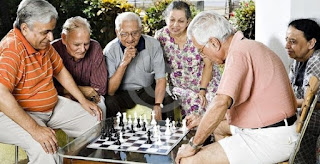Senior Citizens – a liability or an asset ?
Senior Citizens are an assets if they have the right attitude to life and they should feel proud of their ‘grey realities’ instead of camouflage by dyeing them.
Indian society lays high importance on providing care and protection for parents and elderly. Withering of joint family system has contributed to the challenges faced by elderly. Nowadays they are forced to live alone and are exposed to various kinds of problems such as lack of physical, social, emotional and financial support.
Normally a person on retirement from government service becomes a senior citizen but officially, he is treated when he crosses the age of 60 years age. Since I retired from a commercial organization – a non-pensioner service but when I go through the internet and dictionary lying on my study table, a senior citizen is an elderly person, especially an old-age pensioner.
After the retirement, I feel that instead of rejoining a service in extension period, as the governments are now doing, one must do some work and give more time to the society by virtue of his experience. I am very much against joining the service, which means you are snatching the right of a youngster waiting in queue for a job in the market.
There are certain senior citizens who have the right approach in their life and take things in their stride, plan well their retired life and keep their body and mind in reasonable good trim. At the same time, there are others who take a dim view of life and think of retirement as punishment. While the optimists keep themselves busy with productive work, the pessimists become dejected, feel neglected and find fault with everyone.
In fact, the tag senior citizen is generally given to a person who is between 58 and 65 years of age and has superannuated from active service. This age band fixed for retirement was based on the old system followed decades ago when longevity was lower than 60 years. With the advance in medical sciences and health supporting systems, longevity now goes up to 75. Thus, I feel the retirement age needs revision to make use of the services of experienced people for some more time in the interest of national development.
Let me give you more introductions about the senior citizen. The number of senior citizens needing physical and emotional support is increasing every day. The average longevity has increased but at the same time, the number of children per family has fallen. There are two main reasons that the children cannot stay with their parents, one, their workplaces are in a different cities and second, the children are not willing to stay with their parents after marriage, because of understanding gap between them especially with the entry of new-comer in the family on marriage of a son.
It is rightly said that your son is son till he is married and your daughter is a daughter till you are dead.
I recollect when I became President of Senior Citizens Forum and had to arrange counseling for the members and tips to deal with the children from legal point of view.
Anyhow, term senior citizen covers a wide variety of people and they can be fairly health and active 66 years old, like me – barring few problem of blood pressure, enlarged prostate problem which are common at this age – to doddering 90 years old with failing healthy and memory who require a attendance round the clock and their condition keeps weakening with passing years.
I am very much against the Old Age Homes as they cannot provide for emotional needs. Some people overcome the blues by taking recourse to cultural and social activities but others suffer silently. Giving my own example, I joined a number of social organizations to keep myself busy and adopt writing as a daily routine to put wiser the readers and formed Paddlers’ Club and its members are regularly paddling 15 to 30 KMs daily to keep fit and healthy avoiding doctor’s orders.
No doubt, the Maintenance and Welfare of Parents and Senior Citizens Act, 2007, initiated by Ministry of Social Justice and Empowerment, Government of India has been introduced to provide more effective provision for maintenance and welfare of parents and senior citizens and making a legal obligation for children and heirs to provide maintenance to senior citizens and parents by month allowance yet some of the senior citizens prefer to opt to stay at old age homes.
The first case under the act was filed in November 2011 by Siluvai (age 84) and his wife Arulammal (age 80) of Tuticorin against their son and daughter-in-law for neglect, besides taking away their two homes and gold jewellery. This is not a permanent solution.
There are some persons who may not be able to afford old age homes even. They may be single or couples. They come from all regions, religions, caste, economic strata, educational and social backgrounds. But their needs are essentially the same.
Whatever may be the plight of senior citizens, they need various supports and enactment of law would not suffice; rather there is a need to introduce a moral education at the school level so that they when they pass-out, join the service and married, they should repay the debt by taking care of their parents and the concept of Old Age Homes is discarded.
At the same time, the Senior Citizen Forums can help each other by extending their services broadly to arrange errand running services like paying bills, booking train, bus, air tickets and getting repairs done to plumbing, electrical or household equipment, getting groceries, medicines etc. Escort services like accompanying them to a doctor, hospital, shopping malls, family functions, and other recreational activities. Seeing off or receiving the senior citizens at railway stations or airports. Provide drivers to senior citizen in possession of vehicles, companions for chatting, playing chess or cards etc. The job could go to any extend depending upon the requirement of an individual.
I cannot forget the incident when sometime back when certain senior citizens had gone to meet the district administrative officer where the local member legislative assembly was also sitting, to submit a memorandum for giving due respect to the senior citizens in all the offices, he said in a lighter way that senior citizens must look like senior citizens – as out of the five senior citizens, four had dyed their hair but looking young and smart and not senior citizens.
The life of elders is situation dependent now a day. Family situations and financial position do play a part in influencing the lives of elders. Some are fortunate to live with their children or within their reach in the same city/town. They lead a relatively satisfied life. The longer the distance, the greater their feeling is of insecurity and loneliness. If the children are within the country, the parents are fairly satisfied. They can visit them or the children can come home for occasions like marriages and festivals. The fear of separation and loneliness, on the other hand, increase if the children live abroad.
The elders have the dependability to guide the youth and instill the much-needed confidence in them. Only a strong forum of senior citizens drawn from different walks of life can undertake coaching/counseling to students, youth and women to cope with their day-to-day problems.
Frankly speaking , now the question arises as to whether senior citizens have become a liability to the families and society at large or an asset to learn from their past experiences especially. My answer is undoubtedly about the senior citizens is that they are an assets if they have the right attitude to life and they should feel proud of their ‘grey realities’ instead of camouflage by dyeing them.
The present day elders are truly representing the generation of the pre-Independence Ear known for a value-based life full of moral ethics. They were accomplished, humble and honest and did practically to a large extent what was taught to them. They are right source of solace as they can still contribute tremendously to the welfare of the society to tap to tackle a variety of problems in the society, for free by the pensioners and for a nominal honorarium by non-pensioners.
The services of only five per cent of seniors are utilized as consultants and advisory committee members in various sectors, whereas the potential exists to plan to engage their services of around 20 per cent more as there lies a great opportunity to convert the elders into a national asset.





